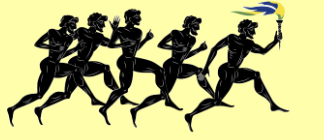The Original Greek Games
The Olympic Games are an international sports festival that began in Ancient Greece. The original Greek games were staged every fourth year for several hundred years, until they were abolished(...) . The revival of the Olympic Games took place in 1896, and since then they have been staged every fourth year, except during World War I and World War II (1916, 1940, 1944). Perhaps the basic difference between the ancient and modern Olympics is that the former was the Ancient Greeks’ way of saluting(...) their gods, whereas the modern Games are a manner of saluting the athletic talents of citizens of all nations. The original Olympics featured competitions in music, oratory(...) , and theatre performances as well. It is certain that during the middle of the summer of 776 BC, a festival was held at Olympia on the highly civilized eastern coast of the Peloponnesian peninsula. As a testimony(...) to the religious nature of the Games (which were held in honour of Zeus, the most important god in the Ancient Greek pantheon), all wars would cease(...) during the contests. According to the earliest records, only one athletic event, a foot race of about 183 metres, or the length of the stadium, was held in the ancient Olympics. The first few Olympics had only local appeal, and were limited to one race on one day. In addition, only men were allowed to compete or attend. A second race, twice the length of the stadium, was added in the 14th Olympics, and a still longer race was added to the next competition, four years later. When the powerful, warlike Spartans began to compete, they influenced the agenda. The 18th Olympiad included wrestling and a pentathlon consisting of running, jumping, spear throwing (the javelin), discus throwing, and wrestling. Boxing was added at the 23rd Olympiad, and the Games continued to expand, with the addition of chariot racing and other sports. In the 37th Olympiad (632 BC), the format was extended to five days of competition. The growth of the Games fostered(...) “professionalism” among the competitors, and the Olympic ideals waned as royalty began to compete for personal gain, particularly in the chariot events. Human beings were being glorified(...) as well as the gods; many winners erected(...) statues to deify(...) themselves. In 394 AD, the Games were officially ended by the Roman emperor Theodosius I, who felt that they had pagan connotations(...) . (Reading text adapted from scholastic)

